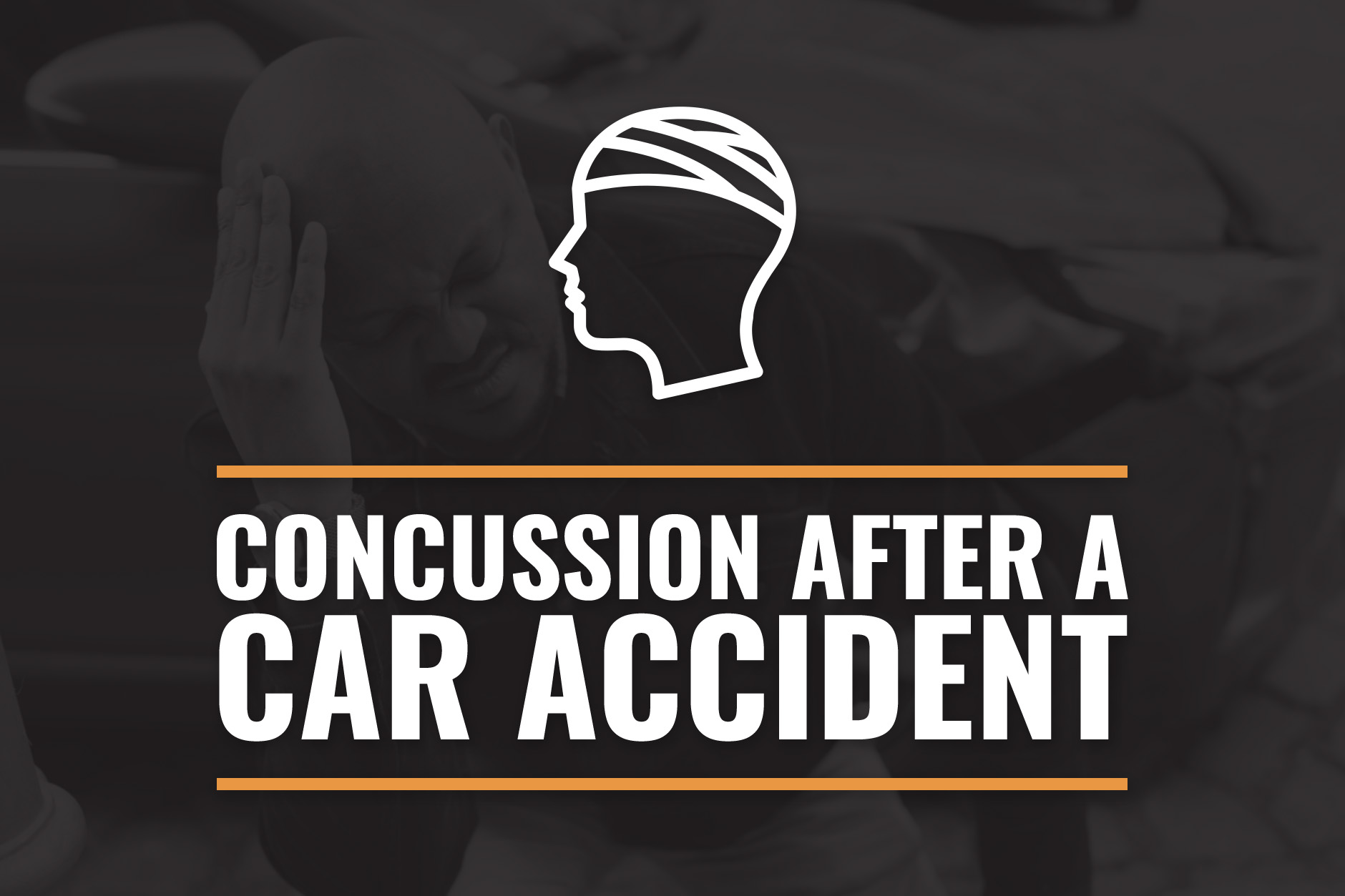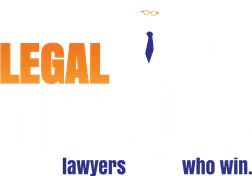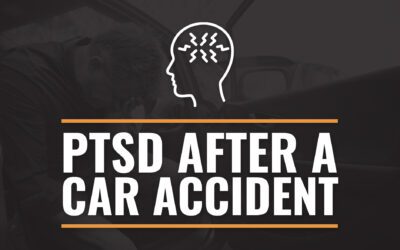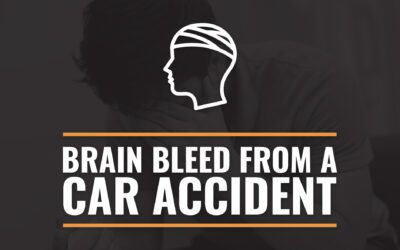
Table of Contents
Concussions are one of the most common injuries in car accidents: according to the Centers for Disease Control and Prevention, they’re a leading cause of visits to the emergency room every year. Unlike broken bones and lacerations, many people don’t even realize they have suffered a concussion until hours or even days after the crash.
If you have been in a car accident and are now experiencing confusion, dizziness, memory problems, or headaches, you may have suffered a concussion. This is why it’s important to know the warning signs, understand how these injuries are diagnosed and treated, and know when to contact a car accident lawyer. This guide will walk you through everything you need to know about concussions after a car accident, including how they happen, how they are treated, and how they can affect your injury claim.
What Is a Concussion?
A concussion is a form of traumatic brain injury (TBI) that occurs when a blow or jolt to the head disrupts normal brain function. It does not always involve a direct hit to the skull: in many car accidents, the force of the impact causes the brain to move rapidly inside the skull, striking the inner walls and triggering damage at a cellular level.
Even if you did not hit your head during the crash, the sudden deceleration alone can be enough to cause a concussion. This makes rear-end collisions and side-impact crashes especially risky since the movement of the head and neck during these events can be violent and unpredictable.
How Concussions Happen in Car Accidents
The brain is a delicate organ suspended in fluid within the skull. When your body experiences a sudden stop, change in direction, or violent force (as it does during a crash), your brain can move sharply inside your skull, hitting the inner walls and causing damage to brain tissue.
Direct Impact to the Head
One of the most common causes is a direct impact to the head, which can happen when your head collides with the steering wheel, dashboard, side window, door frame, or headrest. In moderate to severe crashes, especially if you’re not wearing a seatbelt or if the seatbelt fails, your body may be thrown forward or sideways with enough force to cause blunt trauma.
Rapid Acceleration or Deceleration
When your car stops abruptly (such as in a rear-end collision), your head keeps moving forward and then snaps back. This movement can cause the brain to shift or rotate inside the skull, which can stretch or damage brain cells. This is often referred to as a “coup-contrecoup” injury, where the brain hits one side of the skull, then rebounds and strikes the opposite side.
Airbag Deployment
Airbags are engineered to protect you from severe head and chest injuries, but they deploy at high speeds (often over 150 miles per hour). If your head is close to the airbag when it inflates, the force of the impact can cause a concussion. While the airbag may prevent more serious trauma, the blow itself can still cause the brain to move abruptly and result in a mild to moderate traumatic brain injury.
Whiplash
This injury occurs when the neck is rapidly forced back and forth in a whip-like motion, typically during rear-end collisions. While whiplash is more often associated with soft tissue damage in the neck and shoulders, the motion involved can also cause the brain to shift inside the skull. Even if there’s no visible head injury or obvious blow, this movement is enough to result in a concussion, particularly if the force of the collision is high.
Common Symptoms of a Concussion
Concussion symptoms can begin immediately or develop over time. They may appear within minutes, hours, or even days after the accident. Some symptoms are physical, while others affect your mood, memory, or thinking. Below are the most common signs to watch for.
Physical Symptoms
- Headaches: Headaches are one of the most common and persistent issues. They may start as a dull ache and gradually worsen or come on suddenly with sharp intensity. If the pain continues to build or does not go away with rest or over-the-counter medication, it may point to more significant brain trauma.
- Dizziness: Many people also experience dizziness, which can make it difficult to walk, stand, or turn the head without feeling unsteady. Loss of balance is often tied to changes in how the brain processes motion and coordination.
- Nausea: Nausea is another common complaint, sometimes accompanied by vomiting in the hours following the accident.
- Sensory Issues: Bright lights and loud sounds that never bothered you before can suddenly feel overwhelming. This sensitivity is a result of the brain reacting poorly to external stimuli during recovery.
- Vision Changes: Blurred or double vision can make it difficult to read, use a phone, or focus on objects.
- Tinnitus: Some people develop a persistent ringing in the ears, known as tinnitus, that can interfere with concentration and rest.
- Speech Problems: In more severe cases, your speech may be affected. Words may come out slurred or slow, even if you know exactly what you want to say.
These symptoms are your body’s way of warning you that the brain has been injured. If any of them appear after a car accident, you should get checked by a medical professional immediately.
Cognitive Symptoms
Concussions affect how the brain processes information, which is why cognitive symptoms are so disruptive. Many people find it hard to focus or stay mentally alert: Tasks that once seemed simple (like writing an email, following a conversation, or completing basic errands) may suddenly feel difficult. You might notice that your concentration fades quickly or that you forget what you were doing in the middle of a task.
Other known cognitive issues include:
- Short-Term Memory Loss: You may struggle to recall details from the accident, forget names or appointments, or lose track of recent conversations. This confusion often comes with a mental “fog,” where your thoughts feel slow or disconnected.
- Problems With Decision-Making: Even basic choices, like deciding what to eat or which route to take, can feel frustrating or overwhelming. These symptoms may not seem serious on their own, but they can interfere with work, school, or daily responsibilities.
Emotional and Sleep-Related Symptoms
After the initial injury, you may notice sudden mood changes that feel out of character. This is not just a response to the stress of the accident: it is often a direct result of how the brain is affected by trauma. Common symptoms include:
- Anxiety and Depression: Some people feel overwhelmed by small tasks or develop a sense of hopelessness as symptoms continue. Others report a constant low mood or a sense of disconnection from people around them.
- Sleep Problems: Some people find themselves sleeping far more than usual, struggling to stay awake, or needing naps during the day. Others have trouble falling asleep or staying asleep through the night.
Diagnosing a Concussion
Doctors typically diagnose a concussion based on your symptoms, medical history, and a physical and neurological exam. During the exam, your doctor may check:
Reflexes
- Eye movement and pupil reaction
- Balance and coordination
- Memory and cognitive function
In most cases, imaging tests such as CT scans or MRIs are not required unless the doctor suspects a more serious injury. These scans can help rule out bleeding or swelling in the brain but may not detect a mild concussion. You may also be referred to a neurologist or concussion specialist for further testing. If your symptoms persist for more than a few weeks, follow-up care is critical.
Treatment for a Concussion
There is no single treatment that cures a concussion. Instead, recovery involves rest, symptom management, and close monitoring. Your doctor may recommend:
- Rest and Recovery: Avoid physical activity, screen time, and mental strain during the early stages of recovery. This includes avoiding sports, exercise, loud environments, driving, and extended periods of reading or using a phone.
- Gradual Return to Normal Activities: As symptoms improve, your doctor may guide you through a step-by-step plan to return to normal life. This often starts with light activities such as walking, followed by short periods of work, study, or screen use. Each step should only be taken once symptoms remain stable or have improved. Rushing back too quickly can prolong recovery or cause setbacks.
- Medication: Doctors may prescribe or recommend over-the-counter pain relievers for headaches. However, they usually advise avoiding drugs like ibuprofen or aspirin in the early stages due to the risk of bleeding. For ongoing issues like sleep problems, anxiety, or depression, additional medications or referrals may be needed.
- Therapy and Support: In some cases, patients benefit from physical therapy, occupational therapy, or cognitive rehabilitation. These services help with balance, memory, attention, and other symptoms that interfere with daily life.
How Long Does It Take to Recover From a Concussion?
Most people recover from a concussion within two to four weeks. During this time, symptoms like headaches, fatigue, difficulty concentrating, and mood changes usually improve with rest and gradual return to daily activities. However, recovery time is not the same for everyone. Some people need longer, especially if they have experienced a concussion in the past, have pre-existing conditions such as migraines, or if they delay seeking medical care after the injury. Age can also play a role, with older adults and young children often taking longer to heal.
When concussion symptoms persist beyond the typical recovery period, doctors may diagnose post-concussion syndrome. This condition involves ongoing problems such as frequent headaches, persistent dizziness, memory lapses, difficulty focusing, and emotional changes like irritability or depression. These symptoms can interfere with work, school, sleep, and daily life for weeks or even months after the initial injury.
Proper diagnosis is the first step toward recovery. If your symptoms continue past a few weeks, your doctor may refer you to a neurologist, neuropsychologist, or other specialist for further testing. Treatment may involve physical therapy, cognitive therapy, medication, and lifestyle adjustments to manage symptoms and support brain healing. Early and consistent medical care gives you the best chance of recovering fully and preventing long-term complications.
Why a Concussion Matters for Your Injury Claim
A concussion may not seem as serious as a broken bone, but it can have long-term effects on your health and daily life. It can interfere with work, cause chronic pain, affect your memory, and lead to depression or anxiety. These effects deserve fair compensation, especially when the injury was caused by someone else’s negligence.
Insurance companies often try to downplay concussions because they are invisible injuries. Without a visible wound or a positive scan, they may argue that you are exaggerating or that your symptoms are unrelated to the accident. That is why documentation and legal support are so important.
At LegalGenius, we understand how to handle these claims. We gather medical records, expert opinions, and other evidence to prove the impact your concussion has had on your life. We also fight to recover damages for:
- Medical bills
- Ongoing treatment or therapy
- Lost wages and reduced earning ability
- Pain and suffering
- Emotional distress
If the insurance company does not offer a fair settlement, we are ready to take your case to court.
Get a Free Consultation From a Michigan Car Accident Lawyer
If you believe you suffered a concussion after a car accident, it is important to take action right away. Concussions can lead to long-term health issues, missed work, and medical bills that add up quickly. If another driver was at fault, you may be entitled to full and fair compensation for your injuries, medical treatment, lost income, and pain and suffering.
At LegalGenius, our experienced team understands how to build strong cases, gather the right medical evidence, and negotiate with insurance companies that often try to minimize brain injuries. We handle the paperwork, communication, and legal deadlines so you don’t have to. To learn more or schedule a no-obligation consultation, fill out our Ask the Genius™ form or call 1-800-209-4000 today.

Attorney Jeffrey Perlman
Attorney Jeffrey Perlamn is the managing partner at LegalGenius, PLLC. He has helped Metro Detroit accident victims recover the compensation they deserve for over 35 years. He believes everyone should have access to justice and the legal system, which is why Attorney Perlman spends his time outside of the courtroom writing informational blogs on the LegalGenius website that are accessible to all.


